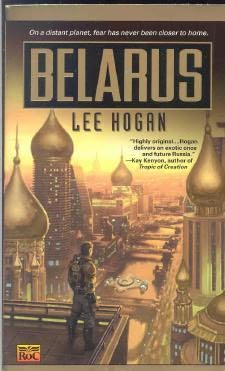
Author: Lee Hogan (Emily Hogan)
Books:
Belarus (2002) 416 pp
Enemies (2003) 416 pp
Belarus and Enemies take place in the same SF universe, with the action in Enemies occurring a thousand years following the action in Belarus.
Belarus is an exhilarating leap into a far future universe where humans have explored almost one fourth of the Milky Way Galaxy. There are a number of physical and mental augments available to humans, depending on status and wealth. Most wealth is controlled by families, who battle among themselves for resources and influence.
From SFReviews.net review of Belarus:
The novel relates the trials and tribulations of a team of Russian colonists in their attempts to settle an alien world they've named Belarus. The leader of the colony expedition is Andrei Mironenko, scion of a long line of Russian nobility whose dream has been to revive Russia's imperial past. Indeed, Andrei is the "tsar" of the colony, though he has introduced a Bill of Rights presumably similar to that in operation in the U.S. Among Andrei's trusted staff are Natalia Korsakova, his cyber-enhanced "world designer," and Grigory, an Enhanced Special Agent (ESA) whose mind is linked to the vast network of Sprites — little AI's — that pass information throughout the Republic which governs all human colony worlds in space.I enjoyed Belarus very much, mostly due to the intriguing interaction of so many plot elements.
No sooner have they arrived in the Belarus system than their Sprites discover some strange alien artifacts orbiting a gas giant. Frightful booby traps within the artifacts nearly kill a team of ESA's sent to investigate....
The colony on Belarus grows and begins to thrive, until families living in outlying rural regions begin disappearing strangely. Horrifically mutilated corpses are found, leading a local law enforcement agent to think there may be a special breed of "superkiller" at work. Hogan/Devenport works for the Arizona Dept. of Corrections, and in this part of the novel she brings her law enforcement expertise to bear.....
It turns out the killers are a group of aliens who have fled to the Belarus system years ago, and their favorite activities seem to be killing, killing and killing, after which they empathically feed on the pain of their victims by devouring their livers.
Enemies, the sequel, is less polished. Flashbacks to Belarus are handled a bit clumsily, and the thousand year time lapse between novels is poorly fleshed out. But once the story gets going, there are some appealing sections of story-telling.
Unfortunately in the last section of the book, Hogan allows her story to come a bit unravelled. Characters make unexplained, uncharacteristic changes in behaviour inconsistent with the rest of the book, resulting in closing passages of the book which seem a bit unlikely as well as rushed. Belarus is clearly the better developed novell.
There is so much potential plot development in this new universe, that the potential is certainly there for follow-up books that are at least as good as Belarus . Hogan needs to examine the strengths and weaknesses of the two books before she extends the series.
I would rank Belarus with Metaplanetary by Tony Daniel, and Gridlinked by Neil Asher, as fairly recent works of far future SF that introduce incredibly imaginative and seminal new SF universes to the reader.
The problem with far-future fiction is that we know humans, human relationships, and human culture will change significantly over time. But in order to maintain reader interest it is necessary to make the ambitions, goals, and relationships of characters resonate with the reader. This conflict between realistic imagination of the future, and the need to make the actors and their problems seem familiar to the reader, is what makes far future science fiction so challenging.

0 Comments:
Post a Comment
<< Home